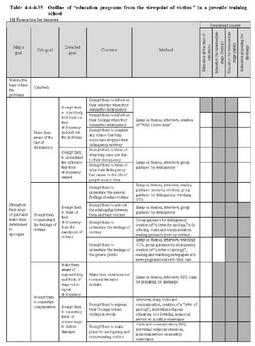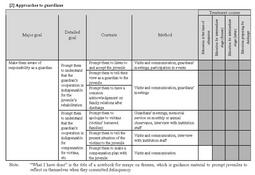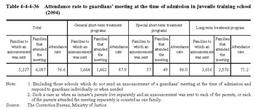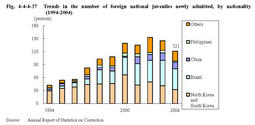| Previous Next Index Image Index Year Selection | |
|
|
7 Issues for the treatment injuvenile training schools and counter measures (1) Enhancement of education programs from the viewpoint of victims In order to educate inmates not to repeat delinquency in the future,it is necessary for them to reflect on their own delinquency and to understand that their delinquency harmed other people.Based on this idea,juvenile training schools have regularly implemented guidance to develop inmates'repentance in various treatment scenes.The serial murder case committed by a juvenile in Kobe in1997,in which the gravity of the delinquency revealed the juvenile's extraordinarily complicated and serious problems,gave rise to the awareness of the necessity of establishing an education course for juveniles who need special treatment in their correction and rehabilitation.As a result,living guidance course G3 was newly established.This course aims to make juveniles aware of the gravity of their delinquency and the feelings of victims and victim's families.
Establishment of living guidance course G3 prompted many juvenile training schools to further enhance various guidance courses they had implemented to deepen inmates'understanding of victims'pain and emotions.At present,such guidance is conducted systematically as"education programs from the viewpoint of victims". The Correction Bureau,Ministry of Justice held workshops for"education programs from the viewpoint of victims"four times,from June to September,2004,inviting intellectuals from outside,such as victim support groups and university officials engaged in research on crime victims,in order to review and enhance"education programs from the viewpoint of victims". At present,"education programs from the viewpoint of victims"have been enhanced based on various opinions submitted in the workshops. Table4-4-4-35 illustrates the outline of"education programs from the viewpoint of victims"at a certain male juvenile training school. Table4-4-4-35 Outline of"education programs from the viewpoint of victims"in a juvenile training school Furthermore,as a part of measures for victims'problems,juvenile training schools hold lectures by crime victims or crime victim supporters,or implement guidance to foster sympathy and make juveniles aware of the importance of life by assigning specialists in welfare or medical fields as a"counselor on life and mind".These measures should be further enhanced with a qualitative improvement of programs,in order to implement guidance that makes inmates aware of the significance of damages and the present situation of victims and victims'families and enables them to express their apologies with specific action. (2) Enhancement of approaches to guardians The"Survey of Juvenile Training School Instructors"pointed out the"problem of parents'ability for leadership"as one of the causes that have made the treatment of juvenile delinquents even more difficult.Many instructors recognize an increase of guardians who have a problem in their ability for leadership(see Chapter3,Section2-3 of this Part).
Juvenile training schools have worked on guardians,asking them for cooperation for inmates'correctional education and smooth reintegration into society,on the occasions of their visits to schools,etc. As a part of these approaches,juvenile training schools hold guardians'meetings right after admission or just before discharge.Guardians are asked to visit schools for these meetings,and receive explanations on the contents of correctional education and the outline of life in the institution.Furthermore,a meeting is held between an inmate,his/her guardian,and an instructor for adjustment of family relations and talks on the inmate's future career after discharge.Families that have participated often say that they could get rid of the negative image they used to have for juvenile training schools after actually seeing the school and hearing explanations from staff officials. Table4-4-4-36 shows the number of families to which juvenile training schools nationwide sent an announcement of a guardians'meeting at the time of admission and the number of families which attended the meeting in2004. Table4-4-4-36 Attendance rate to guardians'meeting at the time of admission in juvenile training school(2004) Juvenile training schools try to develop guardians'relief and sense of trust in schools,consider them as partners in providing juveniles with correctional education,which facilitates correctional education more strongly.Further efforts are required to enhance the ways to positively involve guardians in inmates'correctional education and rehabilitation after discharge,in such way as raising issues of how to break with bad friends or how to secure work,etc.from the school's side at guardians'meetings.(3) Enhancement of treatment of foreign national inmates Among5,300inmates newly admitted to juvenile training schools in2004,121or2.3%were foreign nationals.
Fig.4-4-4-37 shows the number of foreign national juveniles newly admitted since1994,by nationality. In1994,about70%were Korean,but the number of Brazilians and Chinese increased.In2004,the number was the highest for Brazilian with48(accounting for39.7%of121foreign national juveniles newly admitted in2004),followed by Korean with32(26.4%(id.)),and Chinese with15(12.4%(id.)). Fig.4-4-4-37 Trends in the number of foreign national juveniles newly admitted,by nationality(1994-2004) In order to cope with an increase in these foreign national inmates,living guidance course G2 was established in1993for foreign national juveniles who need treatment different from that for Japanese,and a system for specializing in their treatment was developed.At present,10male juvenile training schools and3female juvenile training schools have living guidance course G2.Among all inmates newly admitted in2004,48juveniles(males only)were placed under living guidance course G2.By nationality,Brazilians were the largest in number with38,followed by Chinese with three.By type of delinquency,larceny was the most common with28,followed by robbery(eight),and robbery resulting in death or injury(six)(Source:Annual Report of Statistics on Correction). Living guidance course G2 provides guidance on basic lifestyle,guidance on Japanese language,and treatment focusing on guidance on appropriate life plans/design according to the place of return from the early stages.In addition to these,books and newspapers in their native languages are prepared for securing the chances for them to get information of their native languages and native countries,and interview guidance is also provided regularly by assigned foreign volunteer visitors. In order to thoroughly apply individualized treatment also to G2 inmates,communication between instructors and G2 inmates is indispensable.Therefore,further efforts are required to train staff with foreign language skills and enhance guidance on Japanese language for inmates. Some G2 inmates are allowed to stay in Japan legally after discharge,but others may be displaced as illegal residents.Many of the former cannot blend in to Japanese society due to poor Japanese skills,associating with bad company of the same nationality and end up committing delinquency.For these juveniles,institutional and community-based guidance should be strengthened,considering the particularity of their returning environment,a community of their own nationality located in Japanese local communities.They need to have opportunities to improve their Japanese language skills and fully understand the rules of Japanese society.In contrast,the latter juveniles are apt to see no meaning in life at juvenile training schools.For them,guidance is often ineffective,and ongoing guidance relevant to supervision after discharge cannot be expected in their native countries.Juvenile training schools need to enhance cooperation with guardians and related organizations including embassies in order to get enough information about the social situations and returning environment of juveniles'native countries.They are required to utilize such information in the treatment of those foreign national inmates,and on a long-term basis,establish clearer treatment goals for them. |



